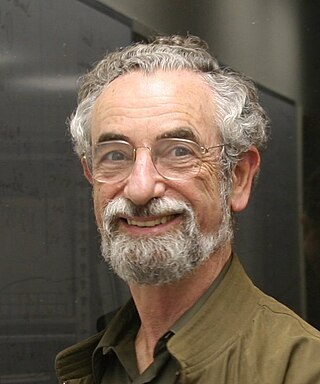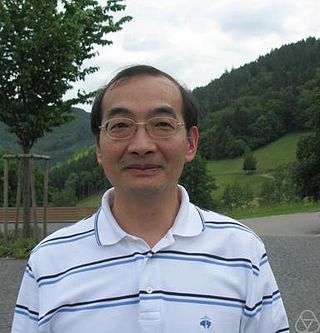Arthur Strong Wightman was an American mathematical physicist. He was one of the founders of the axiomatic approach to quantum field theory, and originated the set of Wightman axioms. With his rigorous treatment of quantum field theories, he promoted research on various aspects of modern mathematical physics.

Elliott Hershel Lieb is an American mathematical physicist. He is a professor of mathematics and physics at Princeton University. Lieb's works pertain to quantum and classical many-body problem, atomic structure, the stability of matter, functional inequalities, the theory of magnetism, and the Hubbard model.

David Pierre Ruelle is a Belgian and naturalized French mathematical physicist. He has worked on statistical physics and dynamical systems. With Floris Takens, Ruelle coined the term strange attractor, and developed a new theory of turbulence.
The International Colloquium on Group Theoretical Methods in Physics (ICGTMP) is an academic conference devoted to applications of group theory to physics. It was founded in 1972 by Henri Bacry and Aloysio Janner. It hosts a colloquium every two years. The ICGTMP is led by a Standing Committee, which helps select winners for the three major awards presented at the conference: the Wigner Medal (1978–2018), the Hermann Weyl Prize and the Weyl–Wigner Award.

Ludvig Dmitrievich Faddeev was a Soviet and Russian mathematical physicist. He is known for the discovery of the Faddeev equations in the quantum-mechanical three-body problem and for the development of path-integral methods in the quantization of non-abelian gauge field theories, including the introduction of the Faddeev–Popov ghosts. He led the Leningrad School, in which he along with many of his students developed the quantum inverse scattering method for studying quantum integrable systems in one space and one time dimension. This work led to the invention of quantum groups by Drinfeld and Jimbo.
The Henri Poincaré Prize is awarded every three years since 1997 for exceptional achievements in mathematical physics and foundational contributions leading to new developments in the field. The prize is sponsored by the Daniel Iagolnitzer Foundation and is awarded to approximately three scientists at the International Congress on Mathematical Physics. The prize was also established to support promising young researchers that already made outstanding contributions in mathematical physics.

Joel Louis Lebowitz is a mathematical physicist widely acknowledged for his outstanding contributions to statistical physics, statistical mechanics and many other fields of Mathematics and Physics.
Walter Eduard Thirring was an Austrian physicist after whom the Thirring model in quantum field theory is named. He was the son of the physicist Hans Thirring.

Oded Schramm was an Israeli-American mathematician known for the invention of the Schramm–Loewner evolution (SLE) and for working at the intersection of conformal field theory and probability theory.

The Henri Poincaré Institute is a mathematics research institute part of Sorbonne University, in association with the Centre national de la recherche scientifique (CNRS). It is located in the 5th arrondissement of Paris, on the Sainte-Geneviève Hill.

Horng-Tzer Yau is a Taiwanese-American mathematician.

Michael Aizenman is an American-Israeli mathematician and a physicist at Princeton University, working in the fields of mathematical physics, statistical mechanics, functional analysis and probability theory.
The International Congress on Mathematical Physics (ICMP) is the largest research congress in mathematical physics. It is held every three years, on behalf of the International Association of Mathematical Physics (IAMP).
Alexei Yurievich Kitaev is a Russian–American professor of physics at the California Institute of Technology and permanent member of the Kavli Institute for Theoretical Physics. He is best known for introducing the quantum phase estimation algorithm and the concept of the topological quantum computer while working at the Landau Institute for Theoretical Physics. He is also known for introducing the complexity class QMA and showing the 2-local Hamiltonian problem is QMA-complete, the most complete result for k-local Hamiltonians. Kitaev is also known for contributions to research on a model relevant to researchers of the AdS/CFT correspondence started by Subir Sachdev and Jinwu Ye; this model is known as the Sachdev–Ye–Kitaev (SYK) model.

Huzihiro Araki was a Japanese mathematical physicist and mathematician who worked on the foundations of quantum field theory, on quantum statistical mechanics, and on the theory of operator algebras.

Robert Seiringer is an Austrian mathematical physicist.

Dmitry Dolgopyat is a Russian-American mathematician specializing in dynamical systems, a field that studies the time evolution of natural and abstract systems. An internationally acclaimed lecturer, he holds the position of Distinguished University Professor at the University of Maryland, and is a foreign member of the Academia Europaea.

The Princeton University Department of Mathematics is an academic department at Princeton University. Founded in 1760, the department has trained some of the world's most renowned and internationally recognized scholars of mathematics. Notable individuals affiliated with the department include John Nash, former faculty member and winner of the 1994 Nobel Memorial Prize in Economic Sciences; Alan Turing, who received his doctorate from the department; and Albert Einstein who frequently gave lectures at Princeton and had an office in the building. Fields Medalists associated with the department include Manjul Bhargava, Charles Fefferman, Gerd Faltings, Michael Freedman, Elon Lindenstrauss, Andrei Okounkov, Terence Tao, William Thurston, Akshay Venkatesh, and Edward Witten. Many other Princeton mathematicians are noteworthy, including Ralph Fox, Donald C. Spencer, John R. Stallings, Norman Steenrod, John Tate, John Tukey, Arthur Wightman, and Andrew Wiles.

Jan Philip Solovej is a Danish mathematician and mathematical physicist working on the mathematical theory of quantum mechanics. He is a professor at University of Copenhagen.













